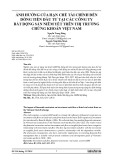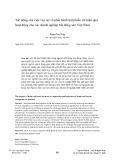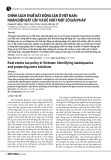
* Corresponding author
E-mail address: buingoctoan@iuh.edu.vn (T.N. Bui)
© 2020 by the authors; licensee Growing Science.
doi: 10.5267/j.uscm.2019.9.001
Uncertain Supply Chain Management 8 (2020) 37–42
Contents lists available at GrowingScience
Uncertain Supply Chain Management
homepage:
www.GrowingScience.com/uscm
Supply chain finance, financial development and profitability of real estate firms in Vietnam
Toan Ngoc Buia*
aFaculty of Finance and Banking, Industrial University of Ho Chi Minh City (IUH), Vietnam
C H R O N I C L E A B S T R A C T
Article history:
Received July 28, 2019
Received in revised format
August 29, 2019
Accepted September 6 2019
Available online
September
6
2019
This paper investigates the impact of supply chain finance (SCF) and financial development
on profitability of real estate firms in Vietnam over the 2013 - 2017 period. This is the first
empirical research examining the impact of financial development on firm profitability. By
employing GMM (generalized method of moment), this paper reveals the important role of
supply chain finance (SCF) and financial development in profitability of real estate firms.
Specifically, firm profitability (P) is influenced negatively by cash conversion cycle (CCC)
and positively by financial development (FD). In addition, profitability is negatively correlated
with control variable of financial leverage (LEV) and positively associated with control
variable of firm size (SIZE). The findings reveal the role of supply chain finance and financial
development in firm profitability which policymakers as well as managers at real estate firms
can apply suitable methods in order to improve firms’ profits.
.
Growing Science, Canada
by the authors; license
20
20
©
Keywords:
Supply chain finance
Financial development
Profitability
Real estate
Vietnam
1. Introduction
After the global financial crisis, Vietnam economy made an impressive recovery which has positive
significant effects on real estate industry. That brings many opportunities for Vietnam’s real estate
companies to extend its market. However, this extension also brings them big challenges, especially to
their limited management skills, so it is compulsory to adjust their business operation and management
skills, especially to improve capital approach ability in order to expand their financial capacities as well
as markets. In specific, participating and completing supply chain finance (SCF) is the most concerned
issue of real estate firms because these activities together with improving capital approach ability play
vital roles in the process of market expansion. SCF brings companies more opportunities to access to
capital (Marak & Pillai, 2019). The fact that SCF works ineffectively and capital approach ability is
limited will increase risks or interruption in the operation of supply chain (Raddatz, 2010). Furthermore,
SCF also brings companies more profits and efficiency (Lekkakos & Serrano, 2016). Especially, after
an economic crisis, credit sources and trade credits from suppliers become constrained so it is even
imperative for Vietnam economy which has just experienced that difficulty period from 2011 to 2012
to complete SCF and raise capital approach ability. Moreover, supply chain finance allows its
participants to reach their targets in cutting capital cost, optimizing working capital as well as boosting
profits (Raghavan & Mishra, 2011). Despite its importance, supply chain finance has been a relatively
new topic to most empirical studies (Caniato et al., 2016). Meanwhile, most of empirical research on
SCF have not used data from financial statements in a wide range of companies, but only surveys or

38
in-depth interviews (Dong et al., 2007). The participation in SCF is not only to optimize companies’
working capital but also to access to medium-term and long-term bank loans. Consequently, national
financial development really helps companies improve their capital approach abilities as well as profits.
Especially for Vietnam, a developing country with a new stock market, credit source is a key factor in
supplying capital for real estate firms. The economic recovery and financial development have been
quite optimistic in recent years (Fig. 1). That contributes a lot in raising profits of real estate companies.
Fig. 1. Financial development in Vietnam (Source: World Bank)
To financial development, most empirical studies are mainly focused on analyzing its role in the
economy. Meanwhile, its specific impact on firm profits has not been paid attention yet. Thus, this
paper is conducted in the objective of giving empirical evidence on the impact of SCF and financial
development on profitability of real estate firms. Its results are expected to help policymakers as well
as managers at real estate firms acknowledge the importance of supply chain finance and financial
development to firm profitability.
2. Literature review and research hypothesis
2.1. Supply chain finance and firm profitability
Supply chain finance (SCF) has been brought in empirical research since the beginning of 21
St
century
(Pfohl & Gomm, 2009). Accordingly, SCF is essential in providing both buyers and sellers with short-
term credit. SCF works effectively when being operated on the technological basis by automating all
transactions and tracking the entire payment process. SCF helps reduce bankruptcy and uncertainty in
the supply chain (Klapper, 2006) in order to stabilize the supply chain. SCF also contributes towards
optimizing the company financial flows (Pfohl & Gomm, 2009). In other words, SCF aims to reduce
capital cost, increase cash flow rate and increase financial relation among the supply chain participants
(Wuttke et al., 2013). Specially, after some economic predicaments, the management aims to the
improvement of supply chain finance (Polak et al., 2012). Companies expect to expand trade credit
from their suppliers to optimize the working capital. This means that SCF allows the optimization of
its working capital and financial liquidity (Liebl et al., 2016). As a result, SCF brings its participants
more profits. About the measurement of SCF, empirical studies usually use indicator of cash conversion
cycle (CCC) (Zhang et al., 2019). CCC is an effective measure in working capital management which
can perfectly represent SCF and concurrently act as a key for the management of the entire supply chain
(Farris & Hutchison, 2002). Accordingly, CCC covers the period starting from the cash outlay to cash
recovery (Fig. 2).
Fig. 2. Individual firm-oriented cash conversion cycle (CCC) (
Source: Zhang et al. (2019))
Cash conversion cycle (CCC)
Accounts receivable period
(DSO)
Cash paid
Cash
received
Inventory
purchased
Inventory period
(DIO)
Accounts payable period
(DPO)
Time
Inventory
sold

T.N. Bui /Uncertain Supply Chain Management
8 (2020)
39
To shorten CCC means that the time for cash recovery becomes shorter and companies can increase
their working capital (constraining capital tie-up) for costs and investment, and then improve firm
profitability (Gul et al., 2013). In general, SCF plays a vital role in improving profitability of the supply
chain participants. In other words, if CCC is low, the cash recovery period will be shortened and the
profits will increase. Therefore, the research hypothesis is suggested as follows:
H
1
: Cash conversion cycle (CCC) has a negative impact on firm profitability (P).
2.2. Financial development and firm profitability.
According to Zaman et al. (2012), financial development can be seen as development on the general
scale of finance and efficiency of financial individual participants. When finance grows effectively, it
will be more advantageous for companies to access to capital, especially medium-term and long-term
one. Accordingly, they can increase their investment and improve their profits. Thus, Fowowe (2017)
asserted that companies (across 30 African countries) which are not credit constrained grow faster than
those which are credit constrained. Financial development also raises the value of household assets.
That makes them feel wealthier, then increase their expenditure, their investment as well as their
housing needs. Consequently, customers of real estate firms can reach higher consumption ability, so
that brings these firms more profits. The role of financial development in the economy has been
examined in many empirical research (Adeniyi et al., 2015). However, specific effects of financial
development on firm profitability has rarely been researched despite their significant existence.
Financial development is measured by indicator of domestic credit to private sector (% of GDP) (Lim,
2018; Pradhan et al., 2018; Eren et al., 2019). Generally, the effective financial development can
improve firm profitability, so the following hypothesis is suggested:
H
2
: Financial development (FD) has a positive impact on firm profitability (P).
3. Data and Methodology
3.1. Data Collection
The paper uses data from World Bank and financial statements of 35 real estate firms listed on Ho Chi
Minh Stock Exchange which is the first centralized and biggest exchange in Vietnam. Its data covers
the 2013-2017 period. Since 2013, Vietnam economy has firmly recovered after the difficult time, so
this period is chosen to assure that the findings are stable and reflect the actual situations accurately.
3.2. Methodology
The author employs regression methods using panel data which consists of Pooled regression (Pooled
OLS), Fixed effects model (FEM) and Random effects model (REM). In order to select the most
appropriate model, F-test is used to giving a choice between Pooled OLS and FEM; meanwhile,
Hausman test is used to choose between FEM and REM.
Source: Compiled by the authors based on theory and prior literature.
Fig. 3. Impact of cash conversion cycle and financial development on profitability
Based on the most appropriate model, the author then conducts testing on multicollinearity,
heteroscedasticity and autocorrelation among errors. After that, Generalized Method of Moment
(GMM) is applied to resolve potential endogenous problems. According to Driffill et al. (1998), GMM
Cash conversion cycle
(CCC)
Financial development (FD)
Firm profitability
(P)
LEV, SIZE
1
H
2
H

40
is better than other regression methods using panel data in testing motion of financial variables.
According to earlier findings, profitability is influenced by cash conversion cycle (CCC) which is an
indicator of supply chain finance (SCF). Further, variable of financial development (FD) which is
anticipated to affect firm profitability is brought in, too. Additionally, firm profitability may be also
correlated with other firm-specific control variables, e.g. financial leverage (LEV), firm size (SIZE)
(Gul et al., 2013). Consequently, the research model is estimated using the following equation:
Pit = β0 + β1 CCCit + β2 FDit + β3 CAPit + β4 SIZEit + εit
In which:
Dependent variable: Firm profitability (P).
Independent variables: Cash conversion cycle (CCC), financial development (FD).
Control variables: Financial leverage (LEV), firm size (SIZE).
Table 1
Summary of variables
Variables
Code
Measurements
Dependent variable
Firm profitability
P
Net profit / Total assets
Independent variables
Cash conversion cycle CCC Days receivable + Days inventories - Days payable
Day Receivable = (trade receivable / sales) * 365
Days Inventory = (total inventories / cost of goods sold) * 365
Days Payable = (trades payable / cost of goods sold) * 365
Financial development
FD
Domestic credit to private sector / GDP
Control variables
Financial leverage
LEV
Total debt / Total assets
Firm size
SIZE
Logarithm of total assets
Source: Compiled by the authors based on theory and prior literature.
4. Empirical Results
Variable correlations are shown in Table 2:
Table 2
Variable correlations
P
CCC
FD
LEV
SIZE
P
1.0000
CCC
-
0.3204
1.0000
FD
0.4919
-
0.2052
1.0000
LEV
-
0.1879
-
0.0161
-
0.0109
1.0000
SIZE
0.2733
-
0.3653
0.1114
0.1080
1.0000
Source: Author's computed
Table 2 indicates that variables of cash conversion cycle (CCC) and financial leverage (LEV) are
negatively correlated with firm profitability (P). Meanwhile, variables of financial development (FD)
and firm size (SIZE) have a positive association with firm profitability (P). Table 3 reveals no serious
problems of multicollinearity and autocorrelation. However, heteroscedasticity has significance at the
1% level. The paper uses Pooled regression (Pooled OLS), Fixed effects model (FEM) and Random
effects model (REM). Results of Hausman test show REM is more appropriate. However,
heteroscedasticity really exists in this model. Therefore, Generalized Method of Moment (GMM) is
chosen to control this problem in order to assure stable and effective estimated results.
Table 3
Results of tests on multicollinearity, heteroscedasticity and autocorrelation
Multicollinearity
test
Heteroscedasticity test Autocorrelation test
Variable
VIF
1/VIF
CCC
1.19
0.8388
Prob > chibar2 = 0.0000*** Prob > F = 0.2317
SIZE
1.17
0.8546
FD
1.05
0.9560
LEV
1.01
0.9874
Mean VIF = 1.11
Note: *** indicates significance at the 1% level. Source: Author's computed

T.N. Bui /Uncertain Supply Chain Management 8 (2020)
41
Table 4
Regression results
P
Pooled OLS
FEM
REM
GMM
Constant
-
42.8794
***
-
66.38501
***
-
49.0017
***
-
20.8736
*
CCC
-
0.0003
**
-
8.37*10
-6
-
0.0002
-
0.0003
*
FD
0.3112
***
0.3176
***
0.3177
***
0.1368
*
LEV
-
0.0599
***
-
0.0441
-
0.0552
**
-
0.0727
***
SIZE
0.6882
***
1.5064
**
0.8778
***
0.5288
*
R
2
35.68%
44.55%
43.94%
Significance level F(4, 170) = 23.57
Prob > F = 0.0000***
F(4, 136) = 27.32
Prob > F= 0.0000***
Wald chi2(4) = 116.25
Prob > chi2 = 0.0000***
Wald chi2(3) = 56.76
Prob > chi2 = 0.0000***
F test Prob > F = 0.0000
***
Hausman test Prob > chi2 = 0.3085
Arellano-Bond test for AR(2) in first differences Pr > z = 0.673
Sargan test Prob > chi2 = 0.534 Number of instruments = 10 Number of groups = 35
Note: *, **, and *** indicate significance at the 10%, 5%, and 1% level, respectively. (Source: Author's computed)
Also, according to Doytch and Uctum (2011), GMM can resolve potential endogenous problems. As
can be seen in Table 4, the results of GMM are appropriate and utilizable. Accordingly, independent
variable which is cash conversion cycle (CCC) exerts negative effects (-0.0003) on firm profitability
(P) at the 10% level of significance. Independent variable of financial development (FD) has a positive
influence (0.1368) on firm profitability (P) at the 10% level of significance. In addition, there exists a
negative relationship (-0.0727) between financial leverage (LEV) and firm profitability (P) at the 1%
significance level, and a positive correlation (0.5288) between firm size (SIZE) and firm profitability
(P) at the 10% level of significance. Accordingly, the results reveal that supply chain finance and
financial development play vital roles in improving profitability of real estate firms in Vietnam.
About supply chain finance: Cash conversion cycle (CCC) negatively contributes to firm profitability
(P), so the hypothesis H1 is accepted. This means that supply chain finance allows its participants to
shorten cash conversion cycle, increase their working capital as well as maintain their funds in order to
sufficiently supply to next operation cycle, reduce external sources, costs, risks and ultimately improve
profits. This result supports what was reported by Gul et al. (2013), Zhang et al. (2019).
About financial development: Financial development (FD) exerts positive effects on firm profitability
(P), so the hypothesis H2 is accepted. This has not been found in earlier studies. Accordingly, it can be
concluded that effective financial development helps firms access capital easily, especially medium-
term and long-term credits. Also, consumption on real estate will raise. Hence, it contributes to the
profit improvement.
5. Conclusions
The results reveal that supply chain finance (SCF) and financial development are the key factors in
improving profitability of real estate firms in Vietnam. Specifically, firm profitability (P) is negatively
influenced by cash conversion cycle (CCC). Furthermore, it was positively affected by financial
development (FD). This is a new finding of this study. Accordingly, this indicates that optimizing
working capital by shortening cash conversion cycle and improving capital approach ability (medium-
term and long-term credits specially) will contribute to real estate firms in gaining more profits.
Besides, financial leverage (LEV) has a negative impact and firm size (SIZE) has a positive impact on
firm profitability (P). Based on these findings, policymakers and managers in real estate firms can
recognize the effects of supply chain finance and financial development on firm profitability. Therefore,
some implications of these results are suggested to improve profitability of real estate firms as follows:
(1) To policymakers, it is necessary to establish suitable policies in the aim of effective financial
development, so real estate firms can have more opportunities to access the capital, especially medium-
term and long-term credits; (2) To managers in real estate firms, it is essential to boost the participation
and completion of supply chain finance. Concurrently, firm operational efficiency also needs improving
to easily access to external sources, e.g. credits, capital raised though stock markets. This paper
succeeds in giving empirical evidence regarding effects of supply chain finance and financial
development on profitability of real estate firms. Nevertheless, the paper has its own limitations when
excluding other control variables which may exert certain association on firm profitability (e.g.


























